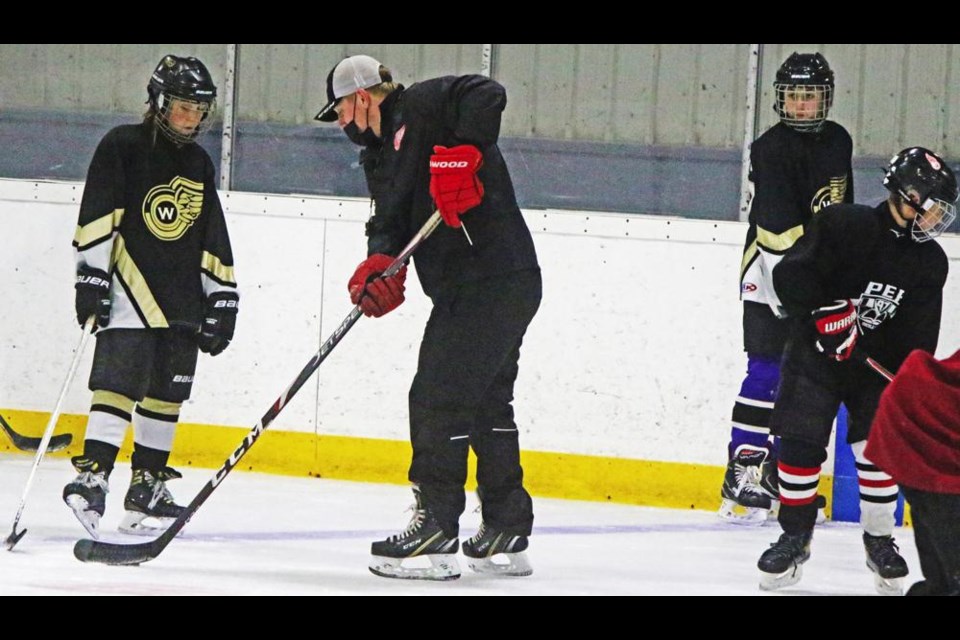WEYBURN - St. Michael School in Weyburn is piloting a program with a Grade 6 class, the Hockey Canada Skills Academy, as a way to integrate the curriculum with hockey to create a unique learning experience for the students.
The Weyburn Rotary Club heard an update about what the program is all about and how it works, from principal Dean Loberg and superintendent Chad Fingler of the Holy Family Roman Catholic Separate School Division.
Explaining some of the philosophy behind the program, Fingler said, “We see ourselves as a deep-learning institution, and we want to be engaged and active. Our kids today are growing up in a different world than the world we grew up in. Their brains are wired differently.”
This program, which was brought to them by Weyburn Minor Hockey volunteer Mike Weger, addresses the need for helping the students’ well-being and giving them a more physically active lifestyle.
“It’s a pilot program right now at St. Michael and at Sacred Heart in Estevan, and our hope is it will grow bigger and be more involved,” he said.
The program was developed by Hockey Canada and has been used across the country, including in Regina and Good Spirit Lake in Saskatchewan.
“It’s completely tied to the provincial curriculum, and every lesson is connected to a learning outcome. Their classroom just happens to be on the ice,” said Fingler.
Loberg noted that at St. Michael, there is a large number of Grade 6 students who play hockey, and this program “is a learning environment that suits them. It’s really making learning fun and engaging for them.”
The program is tuition-based, and they are “very much focused on equity,” added Fingler.
The students who are in the program don’t have to be active hockey players, said Loberg, but they do encourage those interested to at least know how to skate, or if they don’t, to take skating lessons before the classes start.
“We are a strong academic school, and we have lots of extracurricular,” said Loberg, noting that when the program was brought to them, they found this is a sport that a lot of staff and students are passionate about.
There is a tuition fee of $1,000 for the students to take part in this program for the year, as there are extra expenses such as renting ice time, transportation and equipment.
Loberg noted they have received donations to take care of any students whose families are not able to pay this fee, plus the City helped by giving them a very good rate for the ice rental.
“At this point, we haven’t had anyone who needed the help,” said Loberg, adding, “We haven’t turned any students away for not knowing how to play.”
Another important aspect for the students, he said, “We are a Catholic school, first and foremost.”
The program was offered to St. Michael students as first priority, and then if there was room they could take in additional students. They don’t have to become a Catholic, but they have to agree to take part in a Catholic education if they are a part of the program.
Asked what happens when the ice goes out, Loberg noted the program runs from Oct. 1 to the end of March, adding they didn’t want to extend it into playoff time should any of the Weyburn teams end up in a playoff run.
He said that day, which was Thursday, was only the second day the class had been on the ice, and during the school year they are on the ice two afternoons per six-day cycle. They will cover such aspects as power skating, skills development and do dry land training, all under the supervision of a teacher, Tessa Scrupps.
“It’s great that you’re doing this,” said Rotary member Bob King, a retired teacher. “The thing that bothers me is, why can’t you do this with soccer players or lacrosse players, or with dance or drama people?”
Fingler said this is just a pilot program this year, and they will fine-tune it for coming years. He said if someone from a program like Minor Soccer wanted to come forward with a plan that integrates the curriculum like this one does, they could take a look at it.
He noted this isn’t a hockey school, it’s a hockey program within a normal school, and they are not looking to put together a team or to compete with any other teams in minor hockey.
“It’s a skills academy and a classroom,” he added.
“Hockey Canada already had a program like this,” added Loberg. “Maybe that’s the direction we’re going. We can use this as a pilot program. We’re a Pre-K to 9 school, how do we do that and can we do that in other ways?”
Fingler pointed out they have to work with the Ministry of Education on a program like this to ensure the approved provincial curriculum is used throughout.




